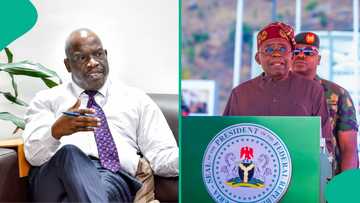Renewed Hope: Presidency Lists 12 Ways Nigerian Economy Has Changed, Full List Emerges
- The special adviser to the president on economic matters in the office of the vice president, Tope Fasua, defended Tinubu on the economy
- Fasua outlined 12 major ways Nigeria’s economy has reportedly evolved under President Tinubu’s administration
- While government officials praise the purported economic reforms under Tinubu, many ordinary Nigerians insist the cost of living remains disturbingly high
Legit.ng journalist Ridwan Adeola Yusuf has over 9 years of experience covering public affairs and governance in Nigeria.
FCT, Abuja - Tope Fasua, special adviser to President Bola Tinubu on economic matters, has insisted that the Nigerian leader’s economic reforms are working.
In a statement on Friday, September 12, obtained by Legit.ng, Fasua explained that Nigeria is on course to becoming an economic model for many African countries.

Source: Facebook
Presidency lauds economic reforms
The presidential aide outlined the accomplishments under Tinubu’s 'Renewed Hope' agenda, acknowledging the current administration’s purported achievements in areas such as gross domestic product (GDP), oil and gas, and infrastructure.
The 12 ways the economy has changed structurally, according to Fasua is highlighted below:
- Only 3% of GDP is oil and gas. They rest is non oil.
- 30% increase in non-oil exports and 30% reduction in all imports.
- Better capturing of entertainment sector where many youths are involved.
- Higher volumes of local manufacturing due to weaker naira and reduced imports.
- Value addition to raw materials becoming a main driver of the economy. Export of manufacturers especially Fast-Moving Consumer Goods (FMCGs) and even cars along west African region.
- New oil and gas industry where Nigeria is net exporter of refined petroleum to US and Saudi and UAE while we have become a new importer of crude oil. Disappearance of fuel queues with ease of local production by Dangote, etc.
- Explosion of hard infrastructure at state levels. Roads, bridges, captive electricity like solar, complemented by FG investment in infrastructure, which is the only way to reduce multidimensional poverty.
- Higher salaries for many workers in private and public sector... helping to mitigate the inflationary effects. More tax reliefs coming January 1 2026.
- Incentive for non-oil exports like cocoa, cashew, soybean, etc with cheaper naira. Cocoa exports made N4trillion for Nigerians in 2024. May be better in 2025. Many have returned to the Land. Palm oil, cocoa, cashew, soybean driving the market and making profits for companies and individuals alike.
- More business opportunities in the local economy as a result of focus on naira and not dollar.
- Stable naira good for planning. Reversal of unnecessary hemorrhage of foreign currency. Many foreign schools now coming to establish in Nigeria eg Charterhouse, King's College etc. Japa for Masters degree has reduced sharply.
- Stable naira is helped by increasing foreign reserves ...$42 billion and growing.

Source: Facebook
Nigerians decry ‘anti-poor’ measures
Meanwhile, some Nigerians denounced the alleged biting economic hardship in the West African country and to call for change.
Speaking to Legit.ng, Lagos-based Yinka Olanegan bemoaned the high cost of living in a country where the minimum monthly wage is N70,000.
He said:
"Everything about Nigeria is painful.
"Everyday, I go home from work, I have to start thinking because it costs me about 1,500 naira when it used to cost me way less. This morning, I could not even buy bean cakes to eat with my bread because they were ridiculously expensive and tiny."
Another Lagosian, Olawale Akinsanya, lamented:
“It’s a basket of grievances: the hunger, high underemployment, the lack of accountability from a tone-deaf government that has imposed a crippling austerity programme on citizens while the ruling class live in luxury."
Tinubu speaks on food prices
Earlier, Legit.ng reported that President Tinubu directed a federal executive council (FEC) committee to implement urgent measures aimed at reducing food prices nationwide.
Aliyu Sabi Abdullahi, the minister of state for agriculture and food security, disclosed this at a capacity-building workshop for senate correspondents in Abuja.
Abdullahi said the directive focuses on securing safe passage for farm produce across transport routes to ease logistics costs.
Source: Legit.ng





